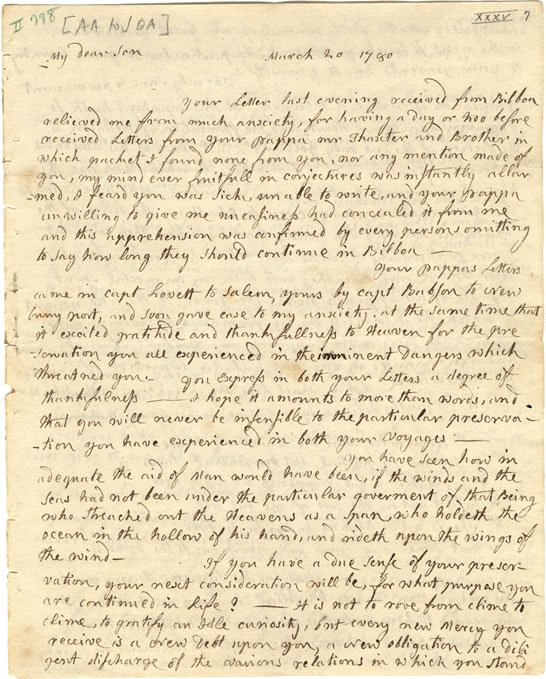
| |
| Printable Version | |
| < Return to Section Seven Introduction | Page: 1 |

 |
||||||||||||||||||||||||||||||||||||||||||||||||||
|
||||||||||||||||||||||||||||||||||||||||||||||||||
|
||||||||||||||||||||||||||||||||||||||||||||||||||
|
|
||||||||||||||||||||||||||||||||||||||||||||||||||
 |
||||||||||||||||||||||||||||||||||||||||||||||||||
|
|
||||||||||||||||||||||||||||||||||||||||||||||||||
Abigail Adams to John Quincy Adams
March 20 1780
My dear son
Your Letter last evening received from Bilboa relieved me from much anxiety, for having a day or two before received Letters from your Pappa, Mr. Thaxter and Brother in which packet I found none from you, nor any mention made of you, my mind ever fruitfull in conjectures was instantly allarmed. I feard you was sick, unable to write, and your Pappa unwilling to give me uneasiness had concealed it from me and this apprehension was confirmed by every persons omitting to say how long they should continue in Bilboa.
Your Pappas Letters came in Capt. Lovett to Salem, yours by Capt. Babson to Newburry Port, and soon gave ease to my anxiety, at the same time that it excited gratitude and thankfullness to Heaven for the preservation you all experienced in the imminent Dangers which threatned you. You Express in both your Letters a degree of thankfulness. I hope it amounts to more than words, and that you will never be insensible to the particular preservation you have experienced in both your Voyages.
You have seen how inadequate the aid of Man would have been, if the winds and the seas had not been under the particular goverment of that Being who streached out the Heavens as a span, who holdeth the ocean in the hollow of his hand, and rideth upon the wings of the wind.
If you have a due sense of your preservation, your next consideration will be, for what purpose you are continued in Life?—It is not to rove from clime to clime, to gratify an Idle curiosity, but every new Mercy you receive is a New Debt upon you, a new obligation to a diligent discharge of the various relations in which you stand
Adams,
Abigail. Letter to John Quincy Adams, March 20, 1780. Adams Family Papers,
Massachusetts Historical Society. Published in Adams Family Correspondence,
Volume 3: April 1778 - September 1780 (Cambridge: The Belknap Press of Harvard
University Press, 1973). Pages 310-313.